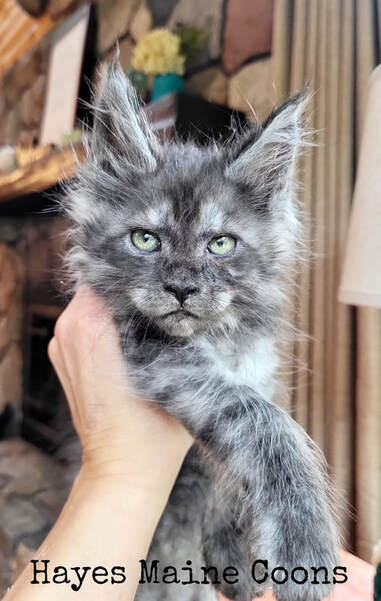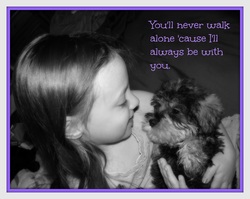Tips for a positive and trusting bond for kids and puppies below.

I firmly believe that positive interaction between your puppy and the children in your life from day one is crucial to influencing your dog's behavior and feelings toward children in general. The number one thing to remember is that DOGS ARE NOT HUMANS. We often want to pretend like our 4-legged friends think and respond to situations like people do and the truth is that they do not. Certain types of touch that we find safe and comforting leave our dogs feeling scared and intimidated. However, this doesn't mean that our kids and our dogs can't be the best of friends. On the contrary, the bond between a child and their dog can be a beautiful thing. Here are some things to remember along the way.

** Always supervise your children with your new puppy. Do not let your child take the puppy off to another room or carry a small puppy around the house. Even the best intentioned children can hold on too tight or even drop them. If your puppy is dropped or injured by a child, it can teach the dog to not trust children and to feel afraid around them. That can lead to nipping and biting. Make sure you are within eyesight of your child and puppy to make sure that they are treating the puppy with respect at all times.
** Allow your puppy to have his/her own space. Every puppy/dog needs a place where they can go to get away from the children or other stimuli in the household. You must teach your child that when the puppy goes into the crate or dog bed that is his/her cue that he wants to be left alone.
** Never allow your children to pull on your puppy's ears, tail, etc. Also they should never be allowed to sit on or lie on your dog. Even hugging should be avoided. Blowing in the puppy's face or ears are also big no-no's. Some people mistakenly think that allowing some of these behaviors will teach a puppy to become tolerant and that is false. It is crucial to teach your children to be respectful of the puppy. The puppy has feelings too! Although some dogs may tolerate this behavior, in general it is a dangerous practice. Even some of these behaviors that make us feel loved and comforted (like hugging) can actually have the opposite effect on our 4-legged buddies, instead causing them to feel intimidated, frightened and annoyed. We often miss the subtle cues our dogs give us that they have 'had enough' or simply don't like what we are doing. Children are especially clueless when it comes to picking up on these hints and that is when even the sweetest dogs can attack and injure a child/baby. Instead, teach your child the proper ways to show affection to the puppy. Teach them to pet the puppy gently, hold them carefully and praising and treating the puppy.
** Teach your child to hold their puppy properly. A puppy needs to feel secure and safe when being held. Teach your child to always support the puppy's bottom and not to carry him/her around with the puppy's legs dangling. You want your puppy to associate your child with feelings of safety and security, not fear.
The bottom line is really R-E-S-P-E-C-T. If you teach your child to be respectful to your puppy, then your puppy and child will be on the right path to a lifetime relationship built on love and trust. The bond between a child and his/her dog can be a beautiful thing and mutually beneficial. I believe that puppies raised around children that love and respect grow up to be some of the most well rounded dogs. The love and friendship they bring to one another is priceless.
** Allow your puppy to have his/her own space. Every puppy/dog needs a place where they can go to get away from the children or other stimuli in the household. You must teach your child that when the puppy goes into the crate or dog bed that is his/her cue that he wants to be left alone.
** Never allow your children to pull on your puppy's ears, tail, etc. Also they should never be allowed to sit on or lie on your dog. Even hugging should be avoided. Blowing in the puppy's face or ears are also big no-no's. Some people mistakenly think that allowing some of these behaviors will teach a puppy to become tolerant and that is false. It is crucial to teach your children to be respectful of the puppy. The puppy has feelings too! Although some dogs may tolerate this behavior, in general it is a dangerous practice. Even some of these behaviors that make us feel loved and comforted (like hugging) can actually have the opposite effect on our 4-legged buddies, instead causing them to feel intimidated, frightened and annoyed. We often miss the subtle cues our dogs give us that they have 'had enough' or simply don't like what we are doing. Children are especially clueless when it comes to picking up on these hints and that is when even the sweetest dogs can attack and injure a child/baby. Instead, teach your child the proper ways to show affection to the puppy. Teach them to pet the puppy gently, hold them carefully and praising and treating the puppy.
** Teach your child to hold their puppy properly. A puppy needs to feel secure and safe when being held. Teach your child to always support the puppy's bottom and not to carry him/her around with the puppy's legs dangling. You want your puppy to associate your child with feelings of safety and security, not fear.
The bottom line is really R-E-S-P-E-C-T. If you teach your child to be respectful to your puppy, then your puppy and child will be on the right path to a lifetime relationship built on love and trust. The bond between a child and his/her dog can be a beautiful thing and mutually beneficial. I believe that puppies raised around children that love and respect grow up to be some of the most well rounded dogs. The love and friendship they bring to one another is priceless.
